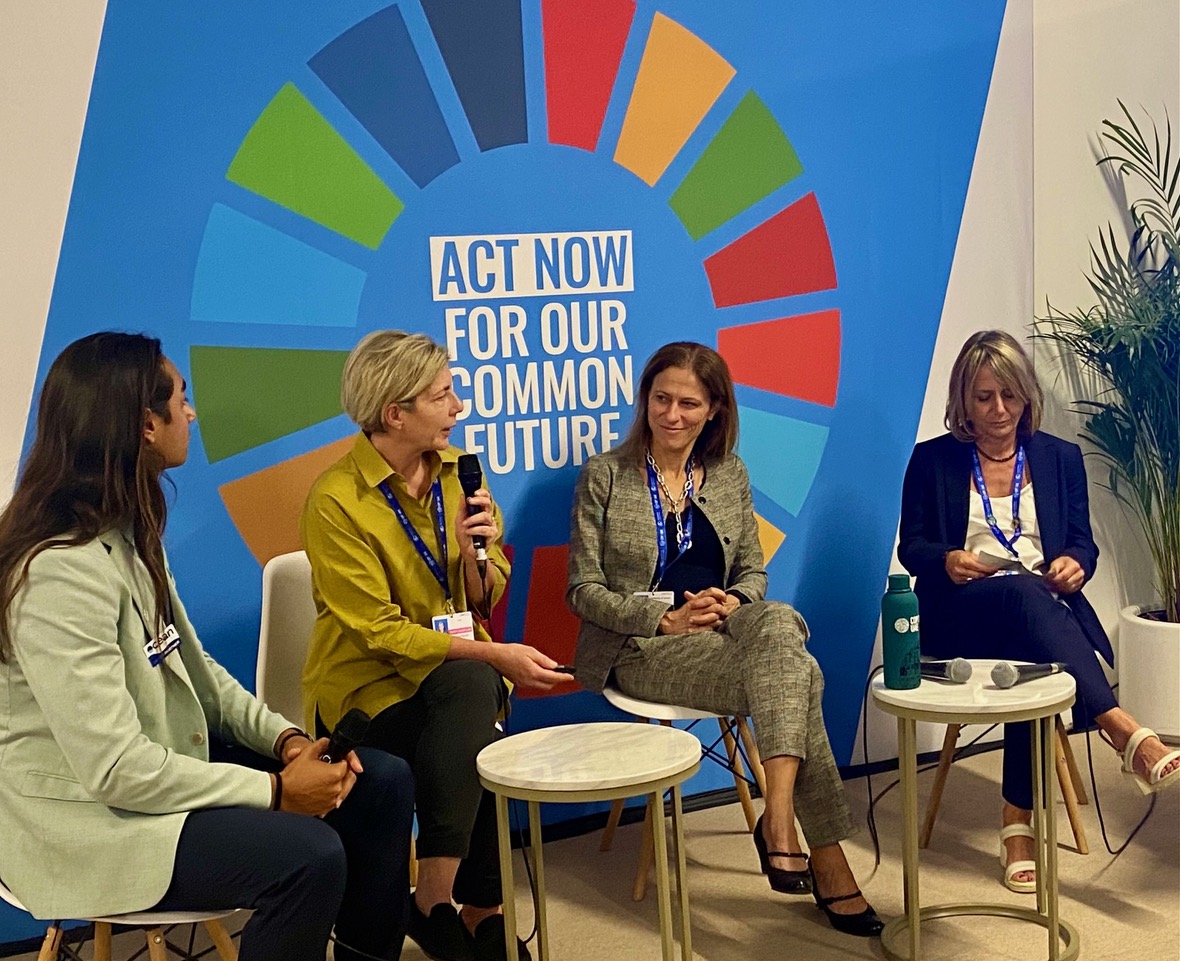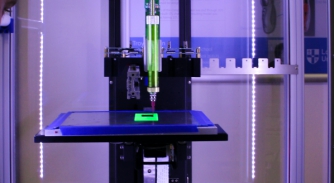Yachting at COP28
A historic agreement was made this year, but COP28 also provided opportunities for yachts to feature their efforts to contribute towards a green transition…

After days of difficult negotiations, a new deal has been agreed upon at the 28th Conference of Parties, (COP28) which, for the first time in history, calls on all countries to actively move away from fossil fuels. Simultaneously, there were many other panels and discussions on topics related to preventing climate change. Among these were some relevant to the superyacht industry.
The annual conference, held this year by the UN in Dubai from the 9th to the 12th of December, brings together governments and other organisations to discuss progress made and agreements reached regarding commitments to prevent climate change. It was at COP21 that the Paris climate agreement was signed.
Sunreef Yachts, a manufacturer of multihull superyachts, including models that incorporate a variety of eco-solutions such as solar panels and electric propulsion, joined a discussion panel on making the energy transition tangible. Later in the week, they presented “Responsible Yachting Today & Tomorrow.” The latter explored currently available environmentally friendly alternatives to traditional power sources, internal and external finishes, and carefully managing systems onboard during operation. Expected trends we can expect to see in the future were also discussed, including novel technologies such as plant-based composites and photovoltaic cell developments.
“At COP28, we had a positive message to share. Today, over 50 per cent of our demand is for electric yachts. This means we are successful in promoting a more responsible yachting experience,” Francis Lapp, Founder and CEO, Sunreef Yachts tells SuperyachtNews. “If there hasn’t been any yacht presence at COP before, it’s because shipyards in general don’t do enough. Many yards say what they will do in the future, but our business is about making things happen today.”
The fact that the 300 biggest boats in the world cause as much emissions as 10 million people was brought up as a way of recognising the issue of yacht emissions, the cause for them to highlight the alternatives available to reduce this issue. As is par for the course by now, a lot of non-industry members reporting on this panel used this as an example of the climate injustice and exorbitant unnecessary emissions of the ultra-rich, alongside the “absurdity” of trying to make these paragons of emissions inequality less environmentally harmful and having the platform to discuss this during such a major climate focused conference.
Sunreef’s aim of the conference was to communicate to those in attendance that yachting and sustainability can, and should, go together. “We have the technology and the right mindset to push this philosophy forward,” says Lapp. “We presented the full range of solutions that we implement on our yachts, and this sparked a positive response. When you realise how much effort and research we carried out, it gives you a new perspective and some optimism.”

Later on in the conference, Vienna Eleuteri, Initiator of Water Revolution Foundation (WRF), was a panellist at a side event co-hosted by the foundation and the University of Genoa, which focused on the ‘Regenerative Blue Economy’. This centred on the link between the sea and climate that demands ocean protection as part of the fight against climate change. The panellists then dissected the concept of moving “beyond sustainability towards regenerative development.”
“There’s a new way to nurture the vitality of our ocean,” Eleuteri says. “By taking ownership of our ecological footprint and investing in key areas of the marine ecosystem, we can go beyond the net-zero race and become nature-positive. Our sector could have an amazing positive impact.” By doing this, we could contribute to the challenges of our time, redefine business models and change the public perception of the industry by contributing substantially to aiding climate change initiatives, she adds.
A method to achieve this regeneration was launched at the event, the eCO2care standard, developed by Eleuteri and the University of Genoa. The approach this standard takes is to go beyond offsetting and rather climate contribution by way of “insetting”, where Regenerative Contribution Units are used to quantitatively assess contributions made by projects regarding sustainable development goals and alignment to the regenerative model of development.
For Eleuteri, the regenerative approach signals a cultural paradigm shift. “We need to build a common language and understanding, overcome the historical antagonism between development and environmental protection, and facilitate access to credible and transparent tools to provide evidence of benefit to the industry and the planet,” she says.
Water Revolution Foundation is integrating this initiative into its Ocean Assist programme—an innovative and effective approach to assume responsibility for its ecological footprint. The programme aims to be an industry-specific method of providing accountability and a means of reinvesting back into the ocean through regeneration and conservation. This works to ensure the well-being of the oceans, which is directly tied to the yachting industry and the lifestyle it provides that is reliant on the oceans. As yachts operate on the vast expanses of the ocean, we bear a unique responsibility as its custodians to safeguard the life within, and this is integral to the onboard experience. No one wants to cruise in a sea devoid of life and biodiversity.

From left to right: Bodhi Patil (Ocean influencer), Vienna Eleuteri, Michela Gallo (University of Genoa) and Adriana Del Borghi (University of Genoa) at COP28.
The Agreements made at the summit will impact policy and regulations which will have different consequences on the industry—particularly driving the development of alternative technologies and their infrastructure to meet emission reduction targets. Secondarily, increased ocean conservation may also lead to restricted activities in vulnerable marine ecosystems.
Once again, however, controversy surrounds the achievements made during each year's summit, with many this year criticising that the language in the new agreement isn't strong enough. Many nations were initially aiming for stronger “phasing out” terminology but were prevented from being included in the agreement due to resistance from major oil-producing nations. This concern extends to those benefiting from the oil and gas industry, a recent Oxfam analysis has shown that a quarter of the billionaire delegates of COP28 made their fortunes from highly polluting industries. Paired with the presence of oil and gas lobbyists at the summit, this has caused some to question whether the right people are in the room for these discussions.
For people on the ground, however, the reaction was different. “Criticism online often comes from people who don’t realise the complexity and diversity of the yachting world. Some tend to throw all kinds of yachts into one category and simply don’t know that [Sunreef’s] biggest focus is promoting clean yachting and building electric yachts,” says Lapp.
“We had some interesting conversations with people who were genuinely interested in the solar power technology and autonomy of the yachts. This is because the people who attended are interested in the topic and already have some knowledge of the current challenges in the marine industry. Their reaction was less emotional and more tech-oriented,” he adds.
Decisions made at COP28 affect global economies, including the maritime industry. Beyond that, there are more relevant discussions in the offshoot panels and presentations that can discuss and advance the activities, policies, and initiatives that can both affect and be adopted by the yachting industry.
Regardless of the criticism, it is also important to note the strategies that are already in place as the industry continues to drive towards a more sustainable future “We are hard at work to provide answers to the challenges we face,” adds Eleuteri. “There is no more time for procrastination. This is the time for shared action and a unified voice from our industry. As in the COP28 youth warning – later is too late.”
Profile links
NEW: Sign up for SuperyachtNewsweek!
Get the latest weekly news, in-depth reports, intelligence, and strategic insights, delivered directly from The Superyacht Group's editors and market analysts.
Stay at the forefront of the superyacht industry with SuperyachtNewsweek
Click here to become part of The Superyacht Group community, and join us in our mission to make this industry accessible to all, and prosperous for the long-term. We are offering access to the superyacht industry’s most comprehensive and longstanding archive of business-critical information, as well as a comprehensive, real-time superyacht fleet database, for just £10 per month, because we are One Industry with One Mission. Sign up here.
Related news
.jpg)
Boero presents its first sustainability report
The Boero Group defines its sustainability strategies
Business

Startups to watch in 2024
With hundreds of millions invested in yachting startups over the course of 2023, Gabbi Richardson highlights the ones to watch in the new year
Business

More sustainability jargon busting
Here, we explain more sustainability terms to equip you with an understanding of this fast-paced area
Technology

FarSounder joins sea mapping project
The forward-looking sonar technologies manufacturer has partnered with The Nippon Foundation to aid scientific research on the seafloor
Crew

Mixed messaging or meaningful change?
Megan Hickling, TSG’s new Sustainability Editor, argues that the superyacht industry should be taking major initiatives that can actually be measured
Opinion

Can the industry print a better future?
3D printing could be the antidote that shipyards are looking for to enhance sustainability credentials
Technology
Related news
Boero presents its first sustainability report
2 years ago
Startups to watch in 2024
2 years ago
More sustainability jargon busting
2 years ago
FarSounder joins sea mapping project
2 years ago
Mixed messaging or meaningful change?
2 years ago
Can the industry print a better future?
2 years ago
NEW: Sign up for
SuperyachtNewsweek!
Get the latest weekly news, in-depth reports, intelligence, and strategic insights, delivered directly from The Superyacht Group's editors and market analysts.
Stay at the forefront of the superyacht industry with SuperyachtNewsweek



